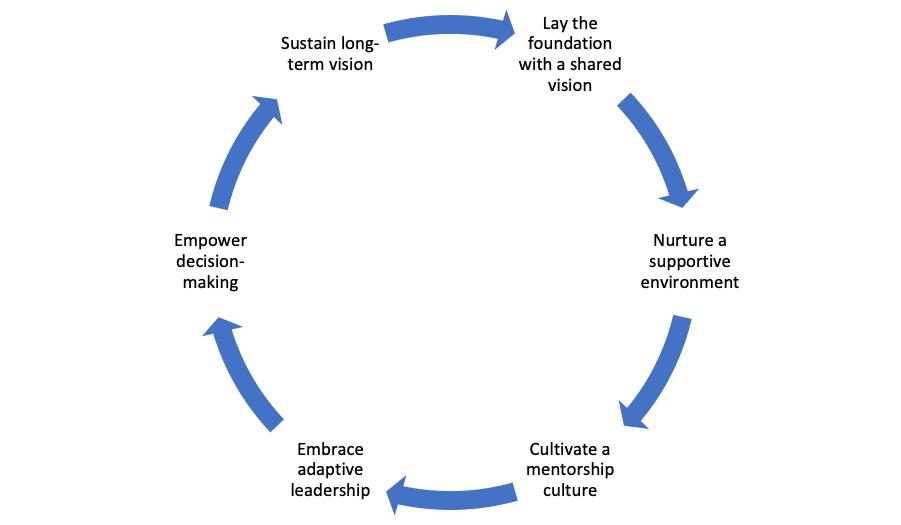THINK LIKE A STRATEGIST:
PART 4 OF 4: THE FAMILY
The process of succession planning in a family-owned business marks a pivotal moment that requires a cohesive and strategic approach. Drawing inspiration from Sun Tzu’s “The Art of War,” a seminal work on strategy and leadership, this article offers insights on how the principles from this ancient text can be applied to support and nurture the new successor leader as they step into their role. In this four part series, we explore how the principles in the Art of War can be applied to four main players when it comes to succession within a family-owned business. This article describes the fourth player – the family. The article outlines a roadmap for the family’s role in fostering a successful transition. Fig 1 summarises these elements in a Family Flowchart.
Fig 1: The Family Flowchart
1. Lay the Foundation with Shared Vision
In Sun Tzu’s teachings, a clear strategy is crucial. Similarly, the family should foster a shared vision for the business’s future. Engage in open discussions about the legacy, values, and aspirations of the family-owned business. By aligning the family’s collective vision with the successor’s leadership, a strong foundation is laid for the new leader to thrive.
2. Nurture a Supportive Environment
Just as Sun Tzu emphasizes the importance of unity among troops, a harmonious family environment is essential for the successor’s success. Encourage open communication, empathy, and mutual respect among family members. Avoid internal conflicts that could negatively impact the business. A supportive and united family front enhances the successor’s confidence and effectiveness.
3. Cultivate a Mentorship Culture
Sun Tzu’s teachings highlight the role of experienced mentors. In the context of succession planning, family elders and senior members can serve as mentors to the successor leader. Share insights, lessons learned, and practical wisdom garnered from years of experience. This mentorship nurtures a smooth transition by providing guidance and facilitating knowledge transfer.
4. Embrace Adaptive Leadership
Adaptability is a cornerstone of Sun Tzu’s philosophy. Encourage the successor leader to embrace adaptive leadership, allowing them to respond effectively to changing business landscapes. Support them in exploring innovative solutions and taking calculated risks. A family culture that encourages experimentation and learning empowers the successor to steer the business toward sustained growth.
5. Empower Decision-Making
Sun Tzu underscores the importance of empowered decision-making on the battlefield. Similarly, in the business arena, entrust the successor leader with decision-making authority. Encourage autonomy while offering guidance when needed. A balance between autonomy and guidance helps the successor develop their leadership skills and fosters confidence in their decisions.
6. Celebrate Small Victories:
In Sun Tzu’s philosophy, celebrating victories boosts morale. Recognise and celebrate the successor’s achievements, even the small ones. Positive reinforcement encourages the new leader’s growth and motivates them to take on greater challenges. A supportive family acknowledges progress, boosting the successor’s self-esteem and commitment.
7. Sustain Long-Term Vision
Sun Tzu emphasises the importance of a long-term perspective. Encourage the successor leader to focus on sustainable growth rather than short-term gains. Provide guidance on building enduring relationships, ethical practices, and a legacy that will stand the test of time. By instilling a sense of purpose and long-term thinking, the family contributes to the business’s continuity.
Conclusion
The principles articulated in Sun Tzu’s “The Art of War” hold valuable insights for guiding the successor leader of a family-owned business during the succession planning process. By fostering a shared vision, nurturing a supportive environment, cultivating mentorship, embracing adaptability, empowering decision-making, celebrating victories, and sustaining a long-term vision, the family can lay the groundwork for a successful transition. In doing so, they honour their legacy while empowering the new leader to navigate the challenges and opportunities that lie ahead.

